Review of 'Locked Up' by former RSDL prisoner Chen Kun
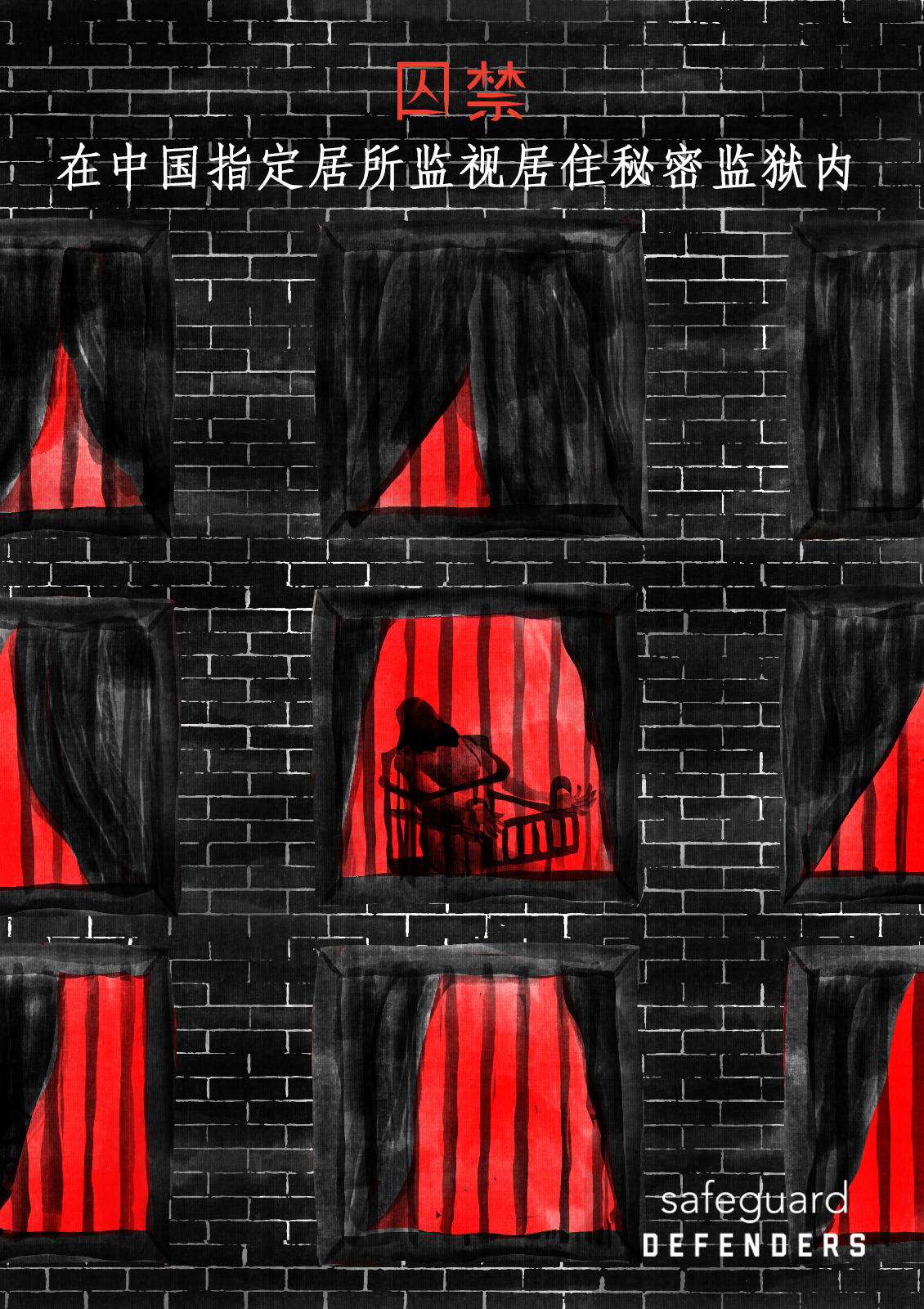 When we released the Chinese language version of our graphic report, Locked Up: Inside China’s Secret RSDL Jails, earlier this month, we never expected it to cause such a stir. It became one of the most-read reports on our website and we received a lot of feedback from readers, including RSDL victims, discussing how their experiences matched or differed from what is depicted in the report. One of those was Chen Kun (陳堃), himself an early victim of this abusive and inhumane custodial system. We invited him to write down his thoughts and experiences.
When we released the Chinese language version of our graphic report, Locked Up: Inside China’s Secret RSDL Jails, earlier this month, we never expected it to cause such a stir. It became one of the most-read reports on our website and we received a lot of feedback from readers, including RSDL victims, discussing how their experiences matched or differed from what is depicted in the report. One of those was Chen Kun (陳堃), himself an early victim of this abusive and inhumane custodial system. We invited him to write down his thoughts and experiences.
Download PDF of Locked Up here in Chinese and here in the original English.
After 2014, the October National Day holiday stopped being just a seven-day family vacation and became an annual memory of a nightmare. On the night of 1 October 2014, my girlfriend (now my wife) was snatched from our home by armed Special Police and quickly transferred into Residential Surveillance at a Designated Location (RSDL) for more than 70 days at a military base on the outskirts of Beijing. Just five days after this, on the afternoon of 6 October 2014, I was also seized by the same group of people, and placed in the same military base under RSDL for 81 days. We were told the reason was because of our support for Hong Kong’s Umbrella Movement.
For most ordinary people, the words - Residential Surveillance at a Designated Location - sounds like a rather soft type of punishment, far softer than any kind of criminal detention or being held in a detention centre. How could anyone imagine that behind this “gentle” name is the most horrific form of unlawful imprisonment and torture?
Over the past six or seven years, I have tried so many times to explain to friends the horror of RSDL, but as I’m no good at drawing I could only describe it using words, something that I can’t help but regret. On 5 October this year, I came across the latest report published by Safeguard Defenders: Locked Up: Inside China's Secret RSDL Jails (or Locked Up). This report is an in-depth exposure of the dark world of China’s RSDL and is the first time that an investigative report has depicted the secret RSDL prison system through rich illustrations, satellite imagery and architectural sketches, bringing its true nature to light. Finally, there is a report with great illustrations and text, to expose this inhumane and illegal form of punishment.
Although remembering those days in RSDL is still a kind of mental torture for me, I carefully read this report through to the end. I discovered that many people had had similar experiences to me, and yet others had experienced even more horrific things, such as being force fed unknown drugs that messed with their minds.
As I read this report, the words and images of others brought my thoughts back to those winter days in Beijing seven years ago. The people I met and the things I experienced while under RSDL came back to me one after the other. Therefore, I would like to borrow Locked Up’s narrative outline to share my personal experiences of RSDL.
Part One: The Raid
From Locked Up: “Surprise is the defining aspect of an RSDL raid.”
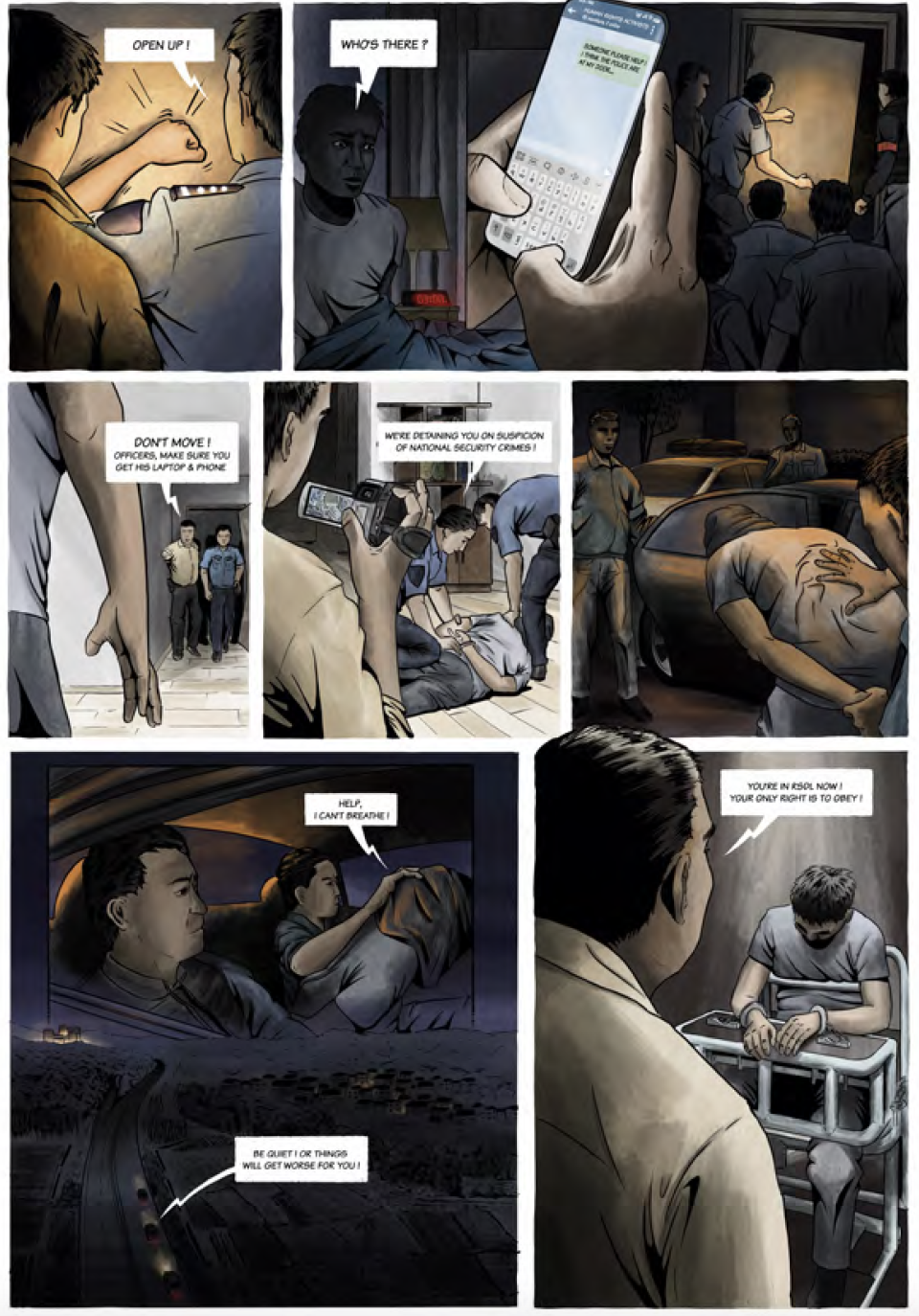 I was captured sometime after 3pm on the afternoon of 6 October 2014. It was on a remote lane in Shangzhuang, Haidian District in Beijing. At that time, I was the only one walking along that lane, when suddenly two men emerged from a jeep parked off to the side. One of them was a domestic security police officer called Mr. E; the other showed me his work ID: Beijing Public Security Bureau, Zhang Jingjing.
I was captured sometime after 3pm on the afternoon of 6 October 2014. It was on a remote lane in Shangzhuang, Haidian District in Beijing. At that time, I was the only one walking along that lane, when suddenly two men emerged from a jeep parked off to the side. One of them was a domestic security police officer called Mr. E; the other showed me his work ID: Beijing Public Security Bureau, Zhang Jingjing.
They asked me: “Are you xxx?”. I said I was. Then they said: “We’ve been waiting for you all day. Come with us!”
Without waiting for my response, they roughly bundled me into the jeep, confiscating my mobile phone and backpack, and leaving me without any opportunity to call anyone for help. I was not even able to send a message to my family and friends telling them I had been detained. Therefore, for the following week, in the eyes of the outside world, I had simply cut off contact with everyone.
They took me from the Beijing suburbs and back to my home, where they forced me to sign a warrant and search notice. Then they placed a black hood over my head and threw me into a police car, leaving behind a dozen police officers to search my home. Because I refused to tell them my mobile phone password right then, the police chief asked his officers to cuff me by twisting one of my arms back over my shoulder and forcing the other behind my back and handcuffing my wrists together -– this position is itself a form of torture.
Our first stop was Dongsheng police station in Haidian District, Beijing, where I was again forced to sign a criminal detention notice for the crime of “Picking quarrels and provoking troubles”. From the police station, we drove for about an hour before we arrived at my RSDL location. It was dusk at that time and autumn in Beijing. I’m also severely near-sighted, and I was wearing a black hood for the entire journey, so I couldn’t see anything of the road outside.
Part Two: Inside RSDL
From Locked Up: “RSDL is shrouded in secrecy.”
Up until now, I still don’t know where I was detained, except that it was a military base full of armed officers, and that I heard the sounds of planes taking off and landing countless times. I suspect that it was near Beijing Nanyuan Airport (in the south) or Beijing Capital Airport (in the northeast).
Several other victims were kept at a State Security RSDL facility near Nanyuan Airport.
According to the detention notice I signed at Dongsheng police station, which they later sent to my family, I was being detained at Haidian District detention centre in Beijing. Actually, until today I still don’t know where Haidian District detention centre is. I went directly from Dongsheng police station to the RSDL location and was kept in the same room in that military base without ever going to any detention centre. When I think about that winter, my poor family went from detention centre to detention centre, carrying my padded clothes, each time being met by: “there is no such person.” Little did they know I was being held in a place that was “outside the law.”
They only asked me to sign an RSDL notice on around the 30th day of my detention. On it, my crime had been changed to “endangering national security.” But by that time, I had already actually been under RSDL for a month.
Part Three: Daily Life
From Locked Up: “Life in RSDL is defined by isolation, boredom and fear. Your only company will be the two guards assigned to watch you 24 hours a day.”
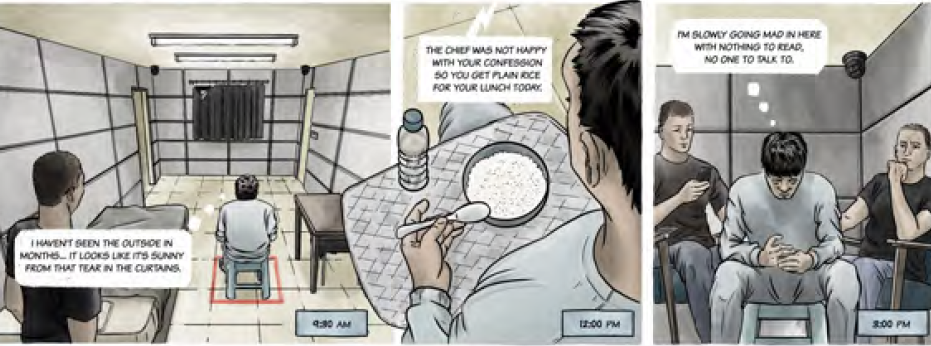
I was detained in Room 302, and guarded by a group of young Armed Police Border Defense Corps. They didn’t know my name, let alone the facts of my case. As far as they were concerned, my name was “302” and I was their “object” (the object to guard).
Coincidentally Locked Up also used the room number 302 in its mock-up of the guard’s logbook.
They worked in shifts of two people, changing every two hours. There were only three kinds of situation when I could leave that room: (1) If I requested to use the toilet; (2) when I was periodically permitted to have a shower; (3) or whenever the people who detained or interrogated me took me out.
Whatever the reason, they would call a third and even a fourth armed officer whenever I left the room. I overheard them say that the two officers guarding me could not take me out of the room otherwise they would be severely punished, and my punishment could be even worse, as they described it, it would be the same as if I had tried to escape.
Before I was detained, I was already wearing glasses for severe myopia. After I was placed into RSDL, especially during the first few dozen days, I had no access to my glasses, even when I was asked to sign something after each interrogation, they did not allow me to put on my glasses. In their words: I only needed to write two characters so it wouldn’t kill me not to wear my glasses.
It wasn’t until later when they gave me a pen and paper and asked me to write down a so-called case statement, that I had a chance to wear my glasses. From the moment I had a pen, paper and glasses, I refused to put them down. The guards were not allowed to know the details of my case so of course they were certainly not allowed to read what I had written, so I often pretended that I was writing the case statement to pass the time, when in fact I was writing some articles and poems that I could still remember.
All the guards were very young and poorly educated. They also secretly chatted with me, but of course only about topics unrelated to my case, for example where we were from, what kind of education we had, whether or not we had married, etc. According to them, I was among the least educated of all the people they guarded because I only had a bachelor’s degree. One thing that stuck with me was that one time, in the middle of the night, I heard an armed police officer crying quietly. It turned out that he had just broken up with his girlfriend! It woke me up and I lay in bed, pretending to still be asleep and stayed motionless, my mouth opening and closing slightly. After I listened to him talk about his relationship, I tried to give him some guidance. Later on, this armed guard turned out to be one of those who was most caring to me, and during his shifts, as much as was possible, he would allow me to move around and write, as long as it was within the rules.
From Locked Up: “The guards, who are given padded armchairs, sit close and on either side of you. When they’re not staring at you, they’re scrolling through their phones.”
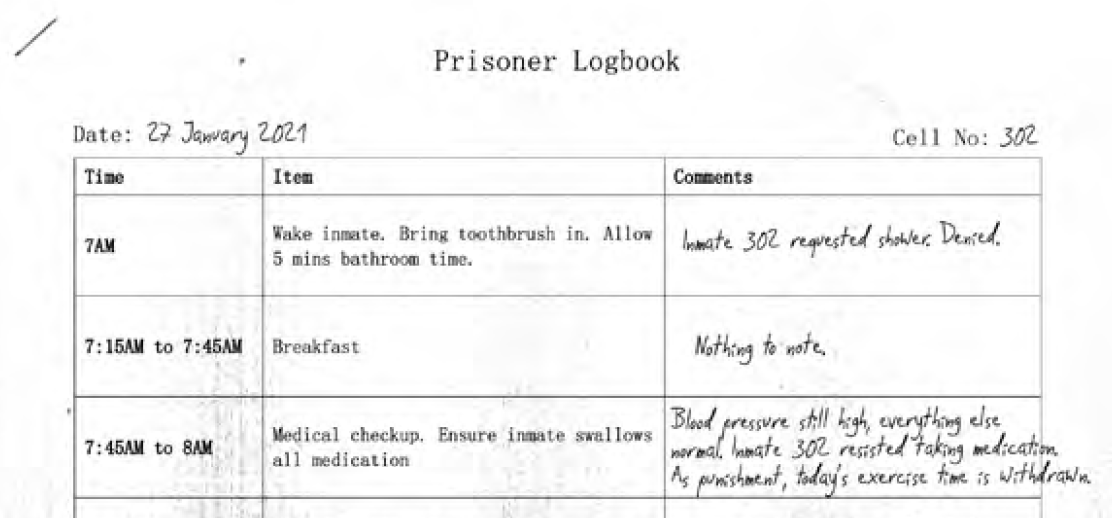
At the time, when I had my experience, objects like mobile phones were strictly forbidden. In the entire military base, only each squad’s leader (Instructor) had a mobile phone. Anyone who wanted to contact someone outside had to request to borrow his phone. Ordinary armed police officers were strictly forbidden from using a mobile phone, because everything in that place was a secret, and could not be exposed. Even when they were not on duty and went back to their dorms to rest, they weren’t allowed to use their phones. More than once, I heard about how instructors would frequently raid and check their dorms, and whenever someone’s just bought phone was discovered, it was smashed on the spot, they also had to write a self criticism letter and were given a major demerit. So, whenever they came into my room there was absolutely no way that they’d be carrying a phone, otherwise both them and myself would have been in enormous trouble.
Part Four: The Cell
From Locked Up: “Everything will be suicide proofed.”
You can say that they went to great lengths to “suicide proof”. Some ways to prevent suicide that I had never thought about before, I learnt about from here.
My cell and interrogation room were one and the same place. Every time the interrogators came, all the guards would get out, and sit at the door waiting for orders. And when the interrogators entered, the surveillance cameras and listening devices were all turned off, because none of the guards could know about the details of the case. And when the interrogators went to leave, three guards (usually there were only two) would immediately enter the room, and check it over.
The first questions the guards would ask me were: Did they let you smoke? Did they give you a knife? Did they give you a needle? Did they beat you?
Afterwards, they would get me to strip naked and inspect me: I would have to squat down, to make sure there was nothing hidden in my genitals or anus; then I would have to sit down, and lift up my legs, to make sure that there was nothing hidden on the bottoms of my feet. The bedding that I spent ages tidying up in the early morning was turned down to check that there were no sharp objects hidden inside. Afterwards, I would have to get dressed again and remake the bed. This was the most humiliating thing for me. They would just say to me: Anyway, you have all the time in the world, what does it matter to you however many times you have to do it again?
Part Five: Torture and Threats
From Locked Up: “They are careful though, they won’t leave any visible marks, usually restricting their punches to your abdomen and back and avoiding the face and lower limbs.”
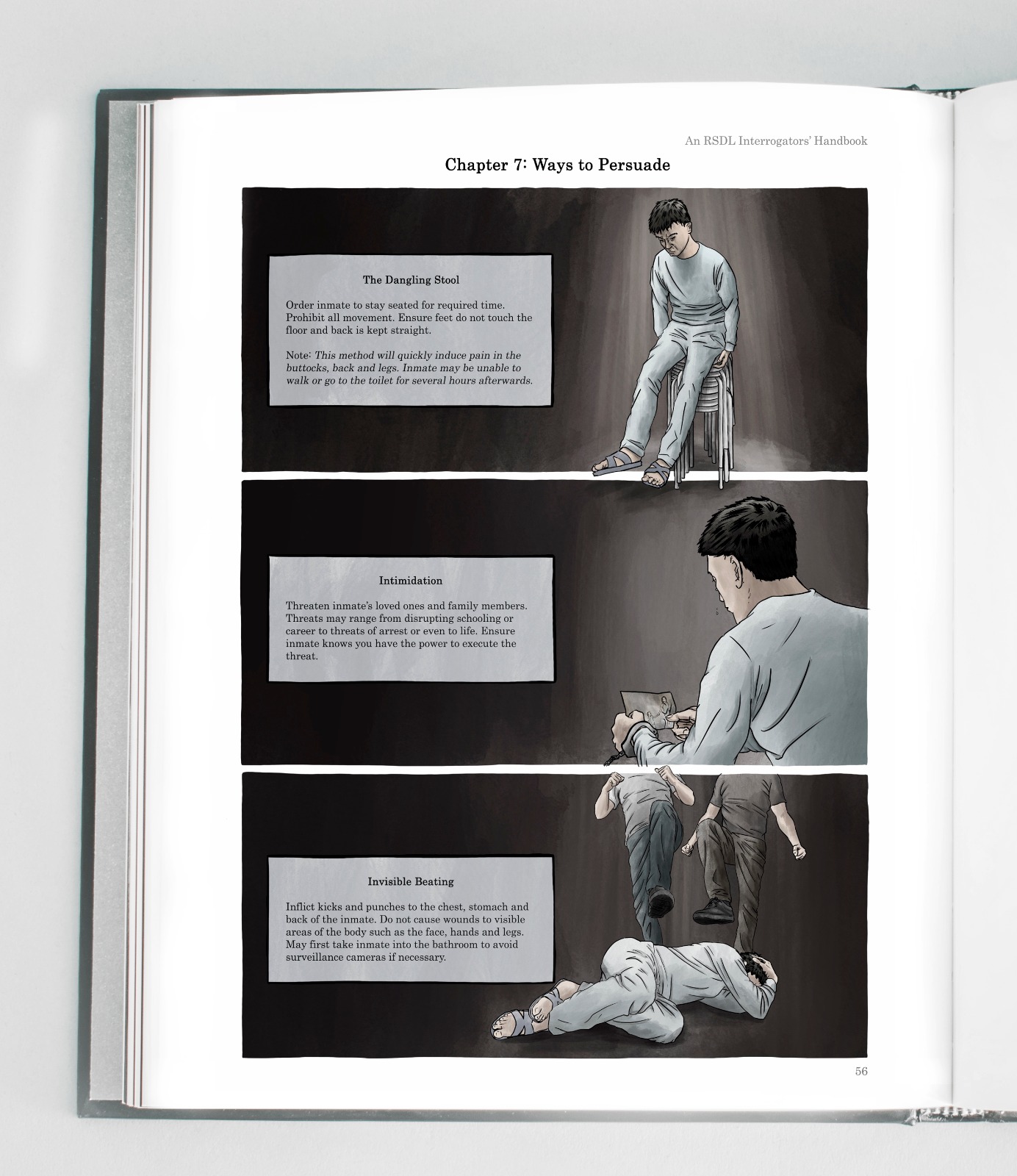 When I was first detained, I had no idea what RSDL was all about. After all it was 2014, According to Locked Up, it was only introduced in 2013. At that time, I asked to see a lawyer, otherwise I would refuse to speak; I also refused to hand over the passwords to my mobile phone and email account… And as you can imagine, I was taken to another building to be tortured.
When I was first detained, I had no idea what RSDL was all about. After all it was 2014, According to Locked Up, it was only introduced in 2013. At that time, I asked to see a lawyer, otherwise I would refuse to speak; I also refused to hand over the passwords to my mobile phone and email account… And as you can imagine, I was taken to another building to be tortured.
They had prepared two wet towels, and tied my wrists together. Then they tied a rope to the wet towels and then hung me from a window bar, with only the tips of my toes touching the ground. In fact, the entire weight of my body was carried by my two wrists. Not content with the torture of just hanging me by my wrists they also started jabbing me all over my body with an extremely small, pen-like electric baton.
Then they asked me: “Do you have a heart condition?” and I said no. They asked again: “Do you want us to help you give you a little heart attack?” I saw that there was some kind of device on a table nearby, and suspected that it was a machine to increase the strength of the electric current. Just then, someone came into my mind: Li Ming, the boss of Galloping Horse Production. He was once a well-known a culture and media figure in China. He got involved in the case of Li Dongsheng, the former Vice Minister of Public Security, who died of a sudden heart attack when he was taken away for investigation. I had heard earlier that he might have been tortured to death. So when I heard my torturer ask me: “Do you want us to help you have a little heart attack?” I was terrified. And I knew that I could no longer refuse to hand over my passwords as I had before.
I had forgotten that during of my first interrogation, they had told me: you are suspected of endangering national security, and your case is very serious, and is being handled jointly by the Ministry of State Security, Ministry of Public Security, the People’s Liberation Army and the People’s Armed Police. I had forgotten the Chinese history I had read before, in such cases, and with departments at these levels, they are never merciful.
Part Six: Final words
Many of my experiences are similar to those described in Locked Up, so I won’t go into them here.
After writing down my account, I suddenly thought about Fu Zhenghua, the butcher who directly persecuted me and my friends, the former Director of Beijing Municipal Public Security Bureau and former Vice Minister of Public Security. He had fallen on 2 October 2021 [Fu was detained for “serious violations” of party discipline]. Seven years earlier, on 1 October, the first of us had been detained [along with Chen and his then girlfriend, several of their friends were also taken into RSDL].
Although it’s true to say that Fu’s fall from power is just the CCP enforcing its gangster law on its own members, it is hard to contain my joy that this typical ruthless and vicious police officer has finally fallen from grace and that this man who directly persecuted us will spend the rest of his life behind bars.
 Chen Kun first became interested in human rights when he was still a university student in 2010 when he joined the Fujian Netizen Project, a campaign to expose a police cover-up of the gang rape and murder of a young woman. He has worked for Transition Institute, an independent think tank, and Liren College, an educational NGO. Both organisations have since been shuttered by the government. He is also the brother of Chen Mei, who was sentenced to 15 months in jail in 2021 for being part of the Terminus2049 project that archived censored articles from the Chinese web including many on the Covid-19 pandemic.
Chen Kun first became interested in human rights when he was still a university student in 2010 when he joined the Fujian Netizen Project, a campaign to expose a police cover-up of the gang rape and murder of a young woman. He has worked for Transition Institute, an independent think tank, and Liren College, an educational NGO. Both organisations have since been shuttered by the government. He is also the brother of Chen Mei, who was sentenced to 15 months in jail in 2021 for being part of the Terminus2049 project that archived censored articles from the Chinese web including many on the Covid-19 pandemic.
Chen now lives in France with his wife.